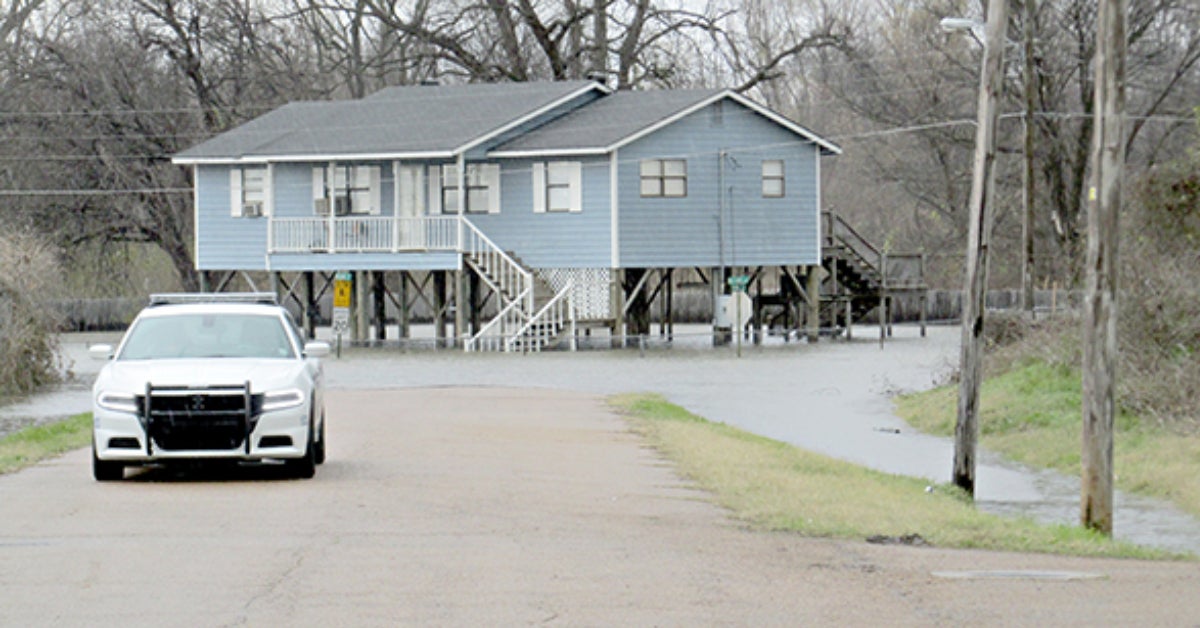Vicksburg Officials urge property owners to be aware of floodplain regulations
Published 2:56 pm Friday, May 12, 2023

- A Vicksburg Police Department car blocks the entrance to Ford Subdivision during the 2016 flood. Ford Subdivision is one of the city's special flood hazard areas. City officials are urging property owners to be informed about FEMA and city floodplain regulations. (Photo by John Surratt | The Vicksburg Post)
Proposed changes in floodplain management and flood insurance policies presently being studied by Federal Emergency Management Agency officials and the insurance companies selling flood insurance could affect city and county residents living in flood-prone areas, Ward 1 Alderman Michael Mayfield said.
Mayfield and city building inspector Benjie Thomas recently attended a floodplain seminar in Natchez that discussed floodplain management policies and hinted at future changes.
Mayfield said he was not sure at this point what those changes will be; he said FEMA is “keeping an open eye and an open ear to what’s going on, and as they know, they inform the cities and the counties across the state.
“But we were told without a shadow that there are going to be some changes as far as the federal government and insurance companies, especially now in cities,” he said.
While city and county officials wait on FEMA and the insurance companies to prepare and announce the policy changes, Mayfield and Thomas said residents living in flood hazard areas should be aware of FEMA and local regulations and programs.
Special flood hazard areas are designated areas or floodplains that are known to flood during certain periods. The flooding does not have to come from a river; it can be flash flooding during periods of heavy rains when storm drain systems back up into streets, on property and into homes.
Vicksburg has several special flood hazard areas; one is in the Sky Farm Avenue area which is susceptible to flash flooding. Two others, the Kings community and Ford Subdivision off North Washington Street, are affected by flooding from the Mississippi River.
Homes in flood hazard areas are considered substantially damaged if the total cost of repairs is 50 percent or more of the structure’s market value before the disaster occurred, regardless of the cause of damage.
“I think a lot of people think that when you live in a flood hazard area that your home can just be damaged by flood and that’s it,” Thomas said, adding that events such as trees falling can contribute to a building’s substantial damage.
If a tornado damages the home, a tree falls on it or it is struck by a car, whether during a flood or not, and the damage to the building is more than 50 percent of the value, the house is considered to be substantially damaged, Thomas said.
“That’s one of the main things I think people need to understand — don’t just rely on water getting in your house,” he said.
Also, Thomas said, people need to understand that homeowner’s insurance does not cover flooding and people need to contact their insurance agent about flood insurance, which is backed by the federal government.
Vicksburg is a member of the National Flood Insurance Program and participated in the community rating system program. The city’s CRS rating is 8, which allows people to get a 10-percent discount on their flood insurance.
Property owners whose homes receive sustainable damage from a flood have several options to deal with the damage. They can repair the home and elevate it at least two feet above the property’s base flood elevation, move the building or demolish it.
They can also choose to sign a memorandum of understanding that will allow them to repair the home under certain conditions. The MOU was used in several cases after the 2011 flood.
Under the MOU, the property owner is allowed to repair the home and live in it, but they understand that they no longer qualify for federal assistance if floodwaters again damage the building.
Mayfield said the city developed the MOU program “because you had people that their grandmother or grandfather lived in that house and they lived there a long time. It’s been here a long time and they really didn’t want to move out or didn’t have the expense to go somewhere else.”
“We did our own substantial damage inspection,” Thomas said. “We actually went to these flooded houses. … We did that and if they were substantially damaged, well, their choices were you had to elevate, you had to move it or you had to just demolish it.”
The property owner is also prohibited from allowing someone else to move into the building. If the building is razed, any new building would fall under the floodplain regulations.
The city has also been involved in buyouts, where it buys heavily damaged property in flood hazard areas. Once bought, the buildings are demolished and no buildings can be built on the property, which must be maintained by the city.
The city conducted buyouts in 1980 in Hamilton Heights after flooding from Hatcher Bayou and after the 2011 flood in Kings and Ford Subdivision.
Mayfield said property owners need to stay informed about flood insurance and city and FEMA regulations about living in a flood hazard area.
“The biggest mistake you can make when you live in a floodplain is going into a situation blind, listening to what somebody else says,” he said.
He urged people to talk with city officials about floodplain regulations to get correct information “and when you leave there, you will be totally aware of what you can or what you cannot do.
“So often, I run into the deal where, ‘My neighbor said I can do so,’ and ‘look at my neighbor, what he did,’” Mayfield said. “That doesn’t work; what it ends up doing is costing you a lot of money that you can’t recoup. Listening to your neighbor would cost you a whole lot of money, and remember; once that money is gone you can’t recoup it. That’s the bottom line here.”






